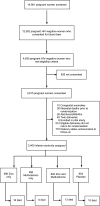Daily Zinc but Not Multivitamin Supplementation Reduces Diarrhea and Upper Respiratory Infections in Tanzanian Infants: A Randomized, Double-Blind, Placebo-Controlled Clinical Trial
- PMID: 26203094
- PMCID: PMC4548161
- DOI: 10.3945/jn.115.212308
Daily Zinc but Not Multivitamin Supplementation Reduces Diarrhea and Upper Respiratory Infections in Tanzanian Infants: A Randomized, Double-Blind, Placebo-Controlled Clinical Trial
Abstract
Background: Although various micronutrient regimens have been shown to prevent and treat common infectious diseases in children, the effects of daily multivitamin (MV) and/or zinc supplementation have not been widely evaluated in young African infants.
Objective: The objective was to determine whether daily supplementation of HIV-unexposed Tanzanian infants with MVs or zinc reduces the risk of infectious morbidity compared with placebo.
Methods: In a 2 × 2 factorial, double-blind, randomized controlled trial, 2400 infants who were 6 wk of age and born to HIV-negative mothers in a low-malaria setting were randomly assigned to receive daily oral supplementation of MVs (vitamin B complex and vitamins C and E), zinc, zinc + MVs, or placebo for 18 mo. Morbidity was assessed by study nurses at monthly visits and by physicians every 3 mo and/or when the child was acutely ill.
Results: No significant differences were found in the percentage of nurse visits during which diarrhea, cough, or any other symptom were reported throughout the previous month when receiving either zinc or MVs. However, physician diagnoses of all types of diarrhea (RR = 0.88; 95% CI: 0.81, 0.96; P = 0.003), dysentery (RR = 0.84; 95% CI: 0.74, 0.95; P = 0.006), and acute upper respiratory infection (RR = 0.92; 95% CI: 0.88, 0.97; P = 0.0005) were significantly lower for infants supplemented with zinc than for those who did not receive zinc. Among the 2360 infants for whom vital status was obtained, there was a nonsignificant increase in all-cause mortality among infants who received zinc (HR = 1.80; 95% CI: 0.98, 3.31; P = 0.06) compared with those who did not receive zinc. MVs did not alter the rates of any recorded physician diagnoses or mortality. Neither zinc nor MVs reduced hospitalizations or unscheduled outpatient visits.
Conclusions: Daily zinc supplementation of Tanzanian infants beginning at the age of 6 wk may lower the burden of diarrhea and acute upper respiratory infections, but provision of MVs using the regimen in this trial did not confer additional benefit. This trial was registered at clinicaltrials.gov as NCT00421668.
Keywords: child morbidity; diarrhea; multivitamins; respiratory infection; zinc.
© 2015 American Society for Nutrition.
Conflict of interest statement
Author disclosures: CM McDonald, KP Manji, R Kisenge, S Aboud, D Spiegelman, WW Fawzi, and CP Duggan, no conflicts of interest.
Figures
References
-
- WHO [Internet]. Geneva (Switzerland): WHO; [cited 2013 Sep 10]. Available from: http://www.who.int/gho/child_health/mortality/mortality_causes_region_te....
-
- Black RE, Victora CG, Walker SP, Bhutta ZA, Christian P, de Onis M, Ezzati M, Grantham-McGregor S, Katz J, Martorell R, et al. . Maternal and child undernutrition and overweight in low-income and middle-income countries. Lancet 2013;382:427–51. - PubMed
-
- Bhutta ZA, Das JK, Rizvi A, Gaffey MF, Walker N, Horton S, Webb P, Lartey A, Black RE, Lancet Nutrition Interventions Review Group; Maternal and Child Nutrition Study Group. Evidence-based interventions for improvement of maternal and child nutrition: what can be done and at what cost? Lancet 2013;382:452–77. - PubMed
-
- Brown KH, Hess SY, Vosti SA, Baker SK. Comparison of the estimated cost-effectiveness of preventive and therapeutic zinc supplementation strategies for reducing child morbidity and mortality in sub-Saharan Africa. Food Nutr Bull 2013;34:199–214. - PubMed
Publication types
MeSH terms
Substances
Associated data
Grants and funding
LinkOut - more resources
Full Text Sources
Other Literature Sources
Medical


